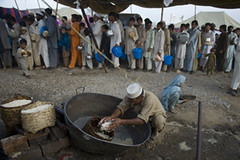
1.5 million Pakistanis are fleeing from the US-backed offensive in the Swat region of the country bordering Afghanistan.
Originally uploaded by Pan-African News Wire File Photos
At least 12 civilians have been killed in an attack by Pakistani jet fighters in the Upper Dir region near Swat, officials and witnesses said.
The victims, including women and children, were members of a family fleeing the fighting, they said.
Meanwhile, the army says that 25 Taleban militants have been killed in recent fighting in Swat.
The army has been fighting the Taleban in Swat and other areas since a peace deal broke down earlier this month.
Nearly 1.5 million people have been displaced by this month's fighting in the north-western region, the United Nations refugee agency says.
The UN has called for urgent and massive international help.
It says that 1.45 million people have been displaced since 2 May, in addition to those displaced by fighting last year - bringing the total to more than two million.
'Jet attack'
Officials who had spoken to the fleeing families told the BBC Urdu service that the civilians were attacked in the mountain passes connecting Swat's Peochar region with Warai town of Upper Dir.
Eyewitnesses said they saw at least 12 bodies on a mountain on the Swat side but could not retrieve them for fear of another aerial attack.
They said the families were targeted by gunship helicopters, but police said they might have been hit by a stray shell.
On Monday night, Pakistan army spokesman told reporters that they had killed 25 militants in Swat over the past 24 hours.
One army officer was also killed in Peochar, while seven soldiers were injured, he said.
Hand-to-hand fighting
Meanwhile, infantry units were readying for a ground offensive in the Matta and Kanju areas where hand-to-hand fighting is expected, he said.
The military says more than 1,000 militants have been killed in the fresh offensive launched two weeks ago.
Officials say nearly 1.4 million people have fled the war zones in Swat, Dir and Buner districts of Malakand region since last month.
The exodus was partly encouraged by the military to keep civilian deaths to a minimum in a hand-to-hand fight which it expects in some parts of Swat valley.
On Monday, an army spokesman said most areas in Dir and Buner had been secured while infantry troops were being launched for a final ground offensive in Swat where the army hopes to trap militants and lure them into a street fight.
Meanwhile, Pakistan's major political parties have declared support for the government's fight against militants in the north-western region of Malakand.
A summit of 43 political parties unanimously resolved on Monday to support the government's efforts to "defend the constitution and sovereignty" of the state.
The signatories to the resolution include some of the staunchest critics of military operation against militants.
Story from BBC NEWS:
http://news.bbc.co.uk/go/pr/fr/-/2/hi/south_asia/8057053.stm
Published: 2009/05/19 13:14:32 GMT
Tuesday, May 19, 2009
16:01 Mecca time, 13:01 GMT
Pakistan grapples with Swat exodus
The UN says only 20 per cent of registered Pakistani refugees are actually in the camps
About 1.5 million refugees have fled the Pakistani military's offensive against Taliban forces in the northwest of the country, officials say.
The fighting has resulted in an exodus with a speed and size that could rival the displacement caused by Rwanda's genocide, the UN said.
The humanitarian challenge comes as the military said its troops are fighting street battles against fighters in important towns in the Swat valley.
Lieutenant-General Nadeem Ahmed, who leads a group dealing with the uprooted Pakistanis, said that the government had enough food for the displaced, but said it needed donations of fans and high energy biscuits.
Mike Hanna, Al Jazeera's correspondent in Islamabad, said: "The staggering figure, in details released by the UN, shows that only about 2,000 people are actually in the refugee camps."
Around 20 per cent of the Pakistani displaced are in about 24 camps at the moment, John Holmes, the UN humanitarian chief, said.
Hanna said: "The rest are staying with family and with friends.
"This is obviously placing an immense amount of strain on the resources of the society as a whole increasing the magnitude of what is the biggest movement of people since the formation of Pakistan in 1947."
Risk of return
Earlier offensives had caused about 550,000 people to flee, though Ahmed said on Tuesday that 230,000 people had returned to Bajaur, a tribal region overrun by the Taliban and targeted in a lengthy military operation.
Speaking in Geneva, Ron Redmond, a spokesman for the UN refugee agency, said the massive displacement of people in such a short space of time "could go back to Rwanda" - a reference to the 1994 massacre of ethnic Tutsis by the majority Hutus in the African country.
The genocide displaced some two million people.
A UN statement had said earlier that 130,950 people had been registered in camps. It was not immediately possible to reconcile the difference.
"The situation is volatile and changing rapidly," Holmes said at the UN headquarters in New York.
Redmond said a lack of help for the displaced and the many thousands of families hosting them could cause more "political destabilisation" for the country.
The US has praised Pakistan's military operation in Swat and surrounding districts, which comes amid long-standing American pressure to root out al-Qaeda and Taliban hide-outs along the border with Afghanistan.
Source: Al Jazeera and agencies
No comments:
Post a Comment